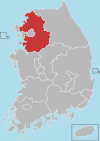Guri
This article needs additional citations for verification. (May 2019) |
Guri
구리시 | |
|---|---|
| Korean transcription(s) | |
| • Hangul | 구리시 |
| • Hanja | 九里市 |
| • Revised Romanization | Guri-si |
| • McCune–Reischauer | Kuri-si |
 Coming into Guri. | |
 | |
| Country | |
| Region | Gyeonggi Province (Sudogwon) |
| Administrative divisions | 8 dong |
| Area | |
| • Total | 33.3 km2 (12.9 sq mi) |
| Population (September 2024[1]) | |
| • Total | 186,571 |
| • Density | 5,550/km2 (14,400/sq mi) |
| • Dialect | Seoul |
Guri (Korean: 구리; lit. Town of Nine Villages[a]; Korean pronunciation: [ku.ɾi]) is a city in Gyeonggi Province, South Korea. It is located immediately to the east of Seoul, in the heart of the Capital Metropolitan Area.
The Royal Tombs of the Joseon Dynasty are located in the city. The hill of Achasan is also located here, site of the Baekje-era Achasanseong and numerous hiking trails. It also has pleasant walking paths along Wang-suk-cheon, a small creek separating Guri from Namyangju. The traditional town market in Doldari (Guri's downtown around what used to be a "stone bridge") provides a cheap alternative to department stores.
Guri first became a separate city in 1986. Previously, it had been considered part of Yangju from antiquity until 1980, and part of Namyangju from 1980 to 1986. The name "Guri" was first used in 1914, at which time it was a myeon in Yangju. Guri is connected to Seoul via two rail lines (Gyeongui–Jungang Line via Guri station, Gyeongchun Line via Galmae station), as well as numerous city transit and intercity buses. In 2014, the extension of Seoul Subway Line 8 began which will connect Guri to the Seoul Metro in October 2023.
Location
[edit]It lies east-northern area of Gyeonggi province. The mountain of Achasan is to the west and the city of Namyangju to east.
The whole area is 33.29 km2 (12.85 sq mi). In fact, Guri used to be bigger but some of the townships were incorporated into Seoul and other cities surrounding Guri.
Topography
[edit]The Gwangju mountains are around the north-western area of Guri. They are usually higher than 1000 meters, but to the exact west, there are lower hills.
Wamgsil Stream and the Han River flow into city and it has about seventeen tributaries.
Climate
[edit]Guri has a humid continental climate (Köppen: Dwa), but can be considered a borderline humid subtropical climate (Köppen: Cwa) using the −3 °C (27 °F) isotherm.
| Climate data for Guri (1995–2020 normals) | |||||||||||||
|---|---|---|---|---|---|---|---|---|---|---|---|---|---|
| Month | Jan | Feb | Mar | Apr | May | Jun | Jul | Aug | Sep | Oct | Nov | Dec | Year |
| Mean daily maximum °C (°F) | 2.3 (36.1) |
5.5 (41.9) |
11.7 (53.1) |
18.7 (65.7) |
24.5 (76.1) |
28.4 (83.1) |
29.8 (85.6) |
30.7 (87.3) |
26.6 (79.9) |
20.5 (68.9) |
12.0 (53.6) |
4.1 (39.4) |
17.9 (64.2) |
| Daily mean °C (°F) | −2.5 (27.5) |
0.4 (32.7) |
6.1 (43.0) |
12.6 (54.7) |
18.4 (65.1) |
22.9 (73.2) |
25.5 (77.9) |
26.1 (79.0) |
21.3 (70.3) |
14.5 (58.1) |
6.8 (44.2) |
−0.4 (31.3) |
12.6 (54.7) |
| Mean daily minimum °C (°F) | −6.9 (19.6) |
−4.2 (24.4) |
0.9 (33.6) |
7.1 (44.8) |
12.7 (54.9) |
18.1 (64.6) |
22.1 (71.8) |
22.5 (72.5) |
17.1 (62.8) |
9.6 (49.3) |
2.3 (36.1) |
−4.8 (23.4) |
8.0 (46.4) |
| Average precipitation mm (inches) | 12.5 (0.49) |
22.5 (0.89) |
32.7 (1.29) |
66.5 (2.62) |
93.4 (3.68) |
116.7 (4.59) |
405.4 (15.96) |
337.2 (13.28) |
133.0 (5.24) |
48.6 (1.91) |
43.7 (1.72) |
17.8 (0.70) |
1,330 (52.36) |
| Average precipitation days (≥ 0.1 mm) | 3.3 | 3.8 | 5.3 | 7.0 | 7.0 | 8.1 | 14.5 | 13.8 | 7.7 | 5.2 | 7.0 | 4.8 | 87.5 |
| Source: Korea Meteorological Administration[2] | |||||||||||||
Notable people from Guri
[edit]- BoA - singer, songwriter, dancer, record producer and actress, she is known as the "Queen of K-pop."
- Xiumin – singer, rapper, dancer, model, actor, MC and member of (EXO, EXO-M and EXO-CBX)
- Jang Dong-woo – singer, rapper, dancer, model, songwriter, producer, actor and MC (Infinite and Infinite H)
- Gong Myung – actor and singer (5urprise)
- Choi Yoo-jung – singer, rapper, dancer, songwriter and actress (Weki Meki)
- Jihyo – singer, dancer and MC (Twice)
- Doyoung - singer, dancer and MC (NCT, NCT U and NCT 127)
Sister cities
[edit] Calamba, Laguna, Philippines[3]
Calamba, Laguna, Philippines[3] Carrollton, Texas, United States[4]
Carrollton, Texas, United States[4]
See also
[edit]References
[edit]- ^ "Population statistics". Korea Ministry of the Interior and Safety. 2024.
- ^ "Climatological Normals of Korea (1991 ~ 2020)" (PDF) (in Korean). Korea Meteorological Administration. Archived from the original (PDF) on 29 January 2022. Retrieved 7 June 2023.
- ^ "Calamba welcomes delegation from sister city in Korea". balita.ph. 25 January 2013. Archived from the original on 11 September 2017. Retrieved 25 April 2018.
- ^ "International Partnership | City of Carrollton, TX". Archived from the original on 2014-04-27. Retrieved 2013-07-22.
Notes
[edit]- ^ The name was coined when 'Gu'ji-Myeon and Mangwu'ri'-Myeon were merged into Guri-Myeon in 1914.[citation needed]
External links
[edit]- City government website (in English)
- City Council website (in Korean)



